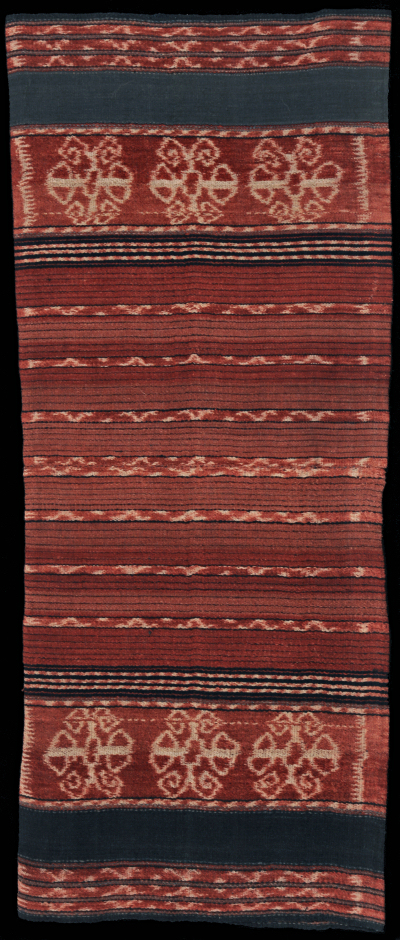| |
 
 | | | |
105 Savu Group, Raijua
Ei (sarong) 
| | Locale: | Village unknown. | | Period: | Early 20th c. | | Yarn: | Cotton, hand-spun, medium | | Technique: | Warp ikat | | Panels: | 2 | | Size: | 37 x 89 cm (1' 2" x 2' 11") LW: 2.41 | | Design: | Narrow horizontal bands, mostly in two shades of morinda red and white, and a few in indigo. Two wide bands, conform tradition, are decorated with three repeats of the main motif in white on red. This motif recalls both the keu motif of Laut�m on Timor and Leti (see PC 248 and PC 195 and the patola jilamprang. Given the number of curls (the jilamprang has eight points) it is more likely related to the keu. Fairly loose weaving. The pinstripes in the roa, the midfield, appear to be distinctive: they are found on Raijua, not on Savu. | | Comment: | Rare old piece in fine condition for its age. Sarongs of this type were made for ceremonial use at the birth of a child, to receive the baby in the world. They were never worn, but placed in the rumah adat and kept there. The fine warp thread is a little overturned, resulting in a pleasant crêpe-like texture. Brittle cloth, some slight fraying. The similarity of the main motif to a motif used on Timor and Leti is intriguing as there are other instances that suggest links between Raijua and islands to its east. | | Background: | Chapters on Savu Group and Raijua. | | Exhibited: | Museu do Oriente, Lisbon, 2014/15 | | Published: |
Woven Languages, 2014.
Ikat Textiles of the Indonesian Archipelago, 2018.
| | Compare: | 104 106 | | Sources: | Similar small sarong from the author's own collection in Duggan, Woven Stories, p. 98. Main motif in the widest ikated bands is similar to that on Leti panel in this collection, PC 248 as well as to the sarong PC 195, and to that on 19th C. Leti fragment in Tropenmuseum, Nr. 2481-40. It is also similar to motif on a new man's cloth made after old patterns in Pitileti, Los Palos area of Lautem, depicted in Hamilton and Barrkman, ed., Textiles of Timor, Fig. 11-8. | | |

©Peter ten Hoopen, 2025
All rights reserved.
|
|


